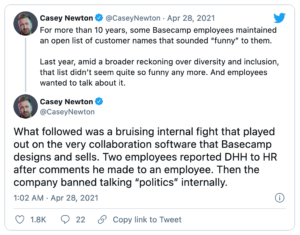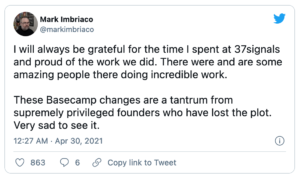Coastal magic
On Friday neither of us had anything in our diaries and so we took the day off and went to the North Norfolk coast to walk and watch birds.
It was an utterly magical day, during which we saw:
- A Jay
- Two Reed Warblers
- Several astonishingly elegant Avocets
- Lots of Pocard Ducks
- Lots of Coots
- An Egret
- A magnificent Curlew, asleep in the sunshine and perched on one leg. (How do they do that without falling over?)
- Two Larks (ascending and descending — all we needed was Vaughan-Williams as a soundtrack.
And the most unexpected thing of all — the call of a cuckoo, repeated several times.
But the thing that stuck in our minds afterwards was the continual birdsong we heard all day.
Quote of the Day
”Democracy: the art of running the circus from the monkey cage.”
- H.L. Mencken
Doesn’t apply to the current occupant of the White House, but does to the Johnson crowd in 10 Downing Street.
Musical alternative to the morning’s radio news
Tom Waits | Christmas Card From A Hooker In Minneapolis
Gravelly beauty.
Long Read of the Day
Low-Skill Workers Aren’t a Problem to Be Fixed
The label “low-skill” flattens workers to a single attribute, ignoring the capacities they have and devaluing the jobs they do.
Great piece piece by Annie Lowrey.
Being a prep cook is hard, low-wage, and essential work, as the past year has so horribly proved. It is also a “low-skill” job held by “low-skill workers,” at least in the eyes of many policy makers and business leaders, who argue that the American workforce has a “skills gap” or “skills mismatch” problem that has been exacerbated by the pandemic. Millions need to “upskill” to compete in the 21st century, or so say The New York Times and the Boston Consulting Group, among others.
Those are ubiquitous arguments in elite policy conversations. They are also deeply problematic. The issue is in part semantic: The term low-skill as we use it is often derogatory, a socially sanctioned slur Davos types casually lob at millions of American workers, disproportionately Black and Latino, immigrant, and low-income workers. Describing American workers as low-skill also vaults over the discrimination that creates these “low-skill” jobs and pushes certain workers to them. And it positions American workers as being the problem, rather than American labor standards, racism and sexism, and social and educational infrastructure. It is a cancerous little phrase, low-skill. As the pandemic ends and the economy reopens, we need to leave it behind.
I couldn’t agree more. From time to time we’ve employed a wonderful small builder. He’s no intellectual, but every time he’s worked on our house what I’ve seen is someone coming up against dozens of unforeseen problems every day — and (here’s the point) solving them! He’s endlessly creative in a way that many (most?) intellectuals are not.
And I think of him every time I tackle a DIY job and run into an unanticipated problem (say, a broken screwhead in an awkward location) which I then spend half a day not solving!
Apple comes out swinging with iOS 14.5
Yesterday’s Observer column:
iOS 14.5 apparently changes all that; now, iPhone users are asked if they want to opt in to tracking. A pop-up dialogue box appears saying: “Allow [app name] to track your activity across other companies’ apps and websites?” and providing two options: “ask app not to track” and “allow”. En passant, note that it says “ask” rather than “tell”, another subtle indicator of how much tech companies actually care about their users’ agency.
When Apple announced months ago that it was planning to make this change, the big shots in the data-tracking racket went apeshit, rightly inferring that many iPhone users would decline to be tracked when offered such an obvious escape route. Suddenly, the lucrative $350bn business of collecting user data to sell to data brokers, or linking a user’s app data with third-party data that was collected in order to target ads, was under threat. The new rules, Apple said, would also affect other app processes, including sharing location data with data brokers and implementing hidden trackers for the purpose of conducting ad analytics. Momentarily taken aback by the ferocity of the storm, Apple decided to postpone the introduction in order to give the industry “time to adapt” to the forthcoming reality, thereby breaking the golden rule that one should never give gangsters an even break.
Basecamp: Take 2
You may recall that on Friday I quoted approvingly the six new principles that Jason Fried, Basecamp’s co-founder, set out as the bullet-points for going forward after a little local difficulty in the 50-person company…
Turns out, I was a trifle naive, not to say gullible. It was more than “a little local difficulty”, as Casey Newton pointed out in “What really happened at Basecamp”.
Interviews with a half-dozen Basecamp employees over the past day paint a portrait of a company where workers sought to advance Basecamp’s commitment to diversity, equity, and inclusion by having sensitive discussions about the company’s own failures. After months of fraught conversations, Fried and his co-founder, David Heinemeier Hansson moved to shut those conversations down.
”In the end, we feel like this is the long-term healthy way forward for Basecamp as a whole — the company and our products,” Fried wrote in his blog post.
Several employees, though, are already making their exit plans.
Basecamp, which makes workplace collaboration tools and launched the email service Hey last year, has long been recognized for producing “opinionated software.”
“We’ve hired opinionated people, we’ve created opinionated software, and now basically the company has said, ‘well, your opinions don’t really matter — unless it’s directly related to business,’” one told me. “A lot of people are gonna have a tough time living with that.”
And Rachel Kraus reported on Mashable that at else a third of employees of the company were quitting.
That’ll teach me to take company founders’ manifestos with a good helping of salt.
And thanks to Greg Jeffreys, Steve Waller and Dave Winer for alerting me to what had ensued from Fried’s bullet points.
This blog is also available as a daily email. If you think this might suit you better, why not subscribe? One email a day, Monday through Friday, delivered to your inbox at 7am UK time. It’s free, and there’s a one-click unsubscribe if you decide that your inbox is full enough already!



